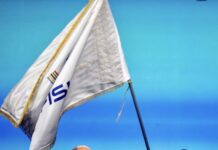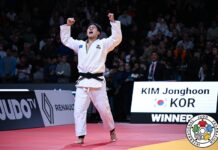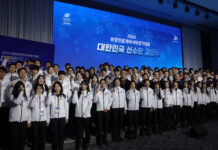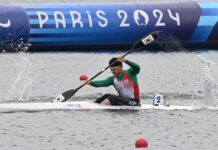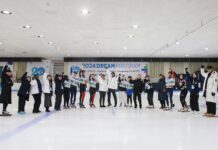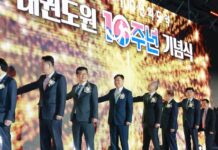
Korean biathlon racer Timofei Lapshin races downhill during a training session in Daegwallyeong-myeon, Pyeongchang-gun County, Gangwon-do Province, in early September.
By Kim Tae Won and Sohn JiAe
Photos = Kim Sunjoo
Pyeongchang l Sept. 5, 2017
“Just as Viktor Ahn, the short-track speed skater who became a Russian citizen, raised awareness of the sport in Russia, so, too, we Korean biathlon racers will make the sport more popular here in Korea.”
Russian-born biathlon racers Anna Frolina and Timofei Lapshin became Korean citizens in March 2016 and March, 2017, and they will be part of Team Korea next year at the PyeongChang 2018 Olympic and Paralympic Winter Games. When Korea.net sat down with them in early September, they seemed confident of getting good results in Pyeongchang.
They were in the middle of training in their home ground of Pyeongchang-gun County in Gangwon-do Province. After practice, they shared their thoughts and feelings about taking part in the Olympics as part of Team Korea.

Korean biathlete Anna Frolina (right) competes in the BMW IBU Biathlon World Cup women’s relay at the Alpensia Biathlon Center in Pyeongchang-gun County, Gangwon-do Province, on March 5. (Korea.net DB)
– What made you decide to become Korean citizens?
Lapshin (L): To be honest, I received many offers and among those options, I followed my heart. I felt that I would be able to make biathlon more popular in Korea, a country barren in terms of the sport.
Frolina (F): No matter what country I represent, I’d like to expand the base of biathlon worldwide. Biathlon is not merely one kind of sporting activity. It’s part of my life. I believe that I can contribute to the development of biathlon by letting more Korean people learn about this sport.
– Have you guys gotten used to living in Korea by now?
F: I was worried about my Korean language ability. However, it’s not a big deal. We’ve trained mostly outside of Korea and we have an interpreter during training sessions, too. So we don’t have any difficulty communicating.
We’ve focused on training since we came here, and haven’t had enough time to travel around the country. After the Winter Games, I’d like to travel around here a bit.
L: I haven’t had any difficulties at all. I’ve gotten used to eating spicy Korean food in just one week. During my stay here, I’ve tried various Korean dishes and I really love bulgogi marinated beef, samgyeopsal grilled pork belly, jaeyuk-bokkeum stir-fried spicy pork, bibimbap mixed rice and kimchi.
– Have there been any differences in your life since you became a Korean citizen?
F: I have home ground advantage now.
There’s an old saying in Russian that, “When you’re at home, even the walls help you.” This proverb makes sense in sports, too. After I became a Korean citizen, I’ve gotten used to the environment at the Pyeongchang venue, which will be a competitive edge for me at next year’s Olympic Games, for sure.
– What’s your goal in PyeongChang next year?
L: I will get really good results.
You know that most Russians didn’t know much about short-track speed skating until Viktor Ahn joined the Russian team. After he won a gold medal at the Sochi 2014 Winter Olympic Games, the popularity of the sport soared instantly and there was a surge in the number of children who wanted to learn the sport. Frolina and I desire to raise awareness of biathlon among people here, just as the skater did in Russia.
– Tell us about your future plans.
L: It’s my priority to put on a good show at PyeongChang.
After the Olympic Games, I’ll continue on Team Korea. My goal is to compete in the Beijing 2022 Winter Games, if I’m still in good shape then. I’ll make biathlon popular here in Korea, too.

Team Korea biathlon coach Andrei Prokunin (left) talks with Russian-Korean biathletes Anna Frolina (center) and Timofei Lapshin after a training session in Pyeongchang, Gangwon-do Province, in early September.
twkim0717@korea.kr


